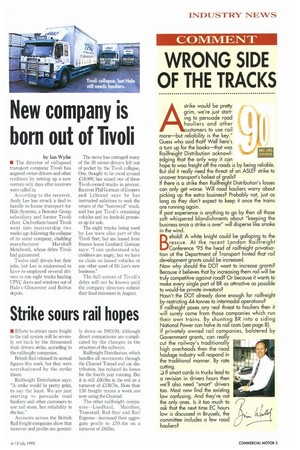WRONG SIDE OF THE TRACKS
Page 7

If you've noticed an error in this article please click here to report it so we can fix it.
strike would be pretty grim, we're just starting to persuade road hauliers and other ustomers to use rail more—but reliability is the key." Guess who said that? Well here's a turn up for the books—that was Railfreight Distribution acknowl edging that the only way it can hope to woo freight off the roads is by being reliable. But did it really need the threat of an ASLEF strike to uncover transport's holiest of grails? IF there is a strike then Railfreight Distribution's losses can only get worse. Will road hauliers worry about picking up the extra business? Probably not, just as long as they don't expect to keep it once the trains are running again. If past experience is anything to go by then all those soft whispered blandishments about "keeping the business once a strike is over" will disperse like smoke in the wind.
Behold! A white knight could be galloping to the rescue. At the recent London Railfreight Conference '95 the head of railfreight privatisation at the Department of Transport hinted that rail development grants could be increased. Now why should the DOT want to increase grants? Because it believes that by increasing them rail will be truly competitive against road? Or because it wants to make every single part of BR as attractive as possible to would-be private investors? Hasn't the DOT already done enough for railfreight by restricting 44-tonnes to intermodal operations? If railfreight poses any real threat to hauliers then it will surely come from those companies which run their own trains. By shunting BR into a siding National Power can halve its rail costs (see page 8). If privately owned rail companies, bolstered by Government grants, can really cut the railway's traditionally high overheads then the road haulage industry will respond in the traditional manner. By rate cutting. D If smart cards in trucks lead to a revision in drivers hours then we'll also need "smart" drivers too. Most now find the existing law confusing. And they're not the only ones. Is it too much to ask that the next time EC hours law is discussed in Brussels, the committee includes a few road 1,1-11111;.nre2




































































































